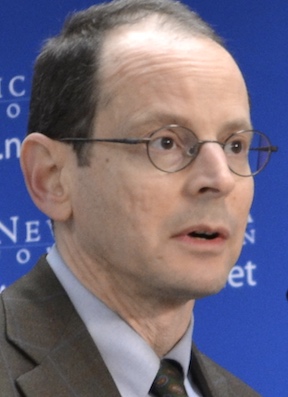On this date in 1960, Jonathan Charles Rauch — journalist, author and gay rights activist — was born in Phoenix, where he grew up. “I am a product of parents who married in 1951 at age twenty-one and twenty-two. My mother was a very bright young woman who gave up her graduate education to become a bored, unhappy housewife. My father was brought up in a man-in-charge world and found himself disoriented by his wife’s need for an independent life. My parents grew apart and their marriage ended in an angry divorce.” He was 12. (Journal of Law and Inequality, Summer 2010)
He called his Conservative Jewish upbringing “pretty thin actually. When I was a kid, you got a bar mitzvah and would never be seen [in synagogue] again. You didn’t really know what the prayers meant. You just said them. There was a sense of routinization about it, and that alienated me.” (Jewish Telegraphic Agency, Feb. 23, 2025)
His father had a successful law practice and raised Rauch and two siblings on his own while their mother moved to Berkeley, Calif., to start a new life. After graduating with a B.A. from Yale University in 1982, Rauch worked at the Winston-Salem Journal in North Carolina before moving to the nation’s capital in 1984. From 1984-89 he covered fiscal and economic policy for the National Journal.
In the ensuing years, he has written eight books and numerous articles in major publications on public policy, culture, lifestyle, religion and government. His award-winning column Social Studies appeared from 1998 to 2010 in the National Journal. As of this writing in 2025, he is a senior fellow in governance studies at the Brookings Institution and a contributing editor of The Atlantic.
Rauch has written extensively on LGBTQ+ civil rights issues. “Jesus himself had nothing to say about homosexuality, but he’s very clear on divorce. You can’t do it. And what I don’t understand is why gay people are the only people in America who have to follow biblical law. … I think what it boils down to is that gay people should deal with the same standards as straight people. And when straight people start upholding biblical law in civic culture, then maybe gay people should consider it, but not until then. (Pew Forum on Religion & Public Life, April 24, 2008)
He and Michael Lai were married in the District of Columbia in 2010. “I owe my marriage to identity politics. In 1960, I was born into a world where openly homosexual Americans were legally banned from federal employment, informally banned from much private employment, terrorized on the streets, persecuted by police, pathologized by psychiatrists, reviled from the pulpit, and made to live a lie.” (The New York Review of Books, Nov. 9, 2017)
In a 2003 column, he wrote about someone asking him about his religious beliefs. ” ‘Atheist,’ I was about to say, but I stopped myself. ‘I used to call myself an atheist,’ I said, ‘and I still don’t believe in God, but the larger truth is that it has been years since I really cared one way or another. I’m — that was when it hit me — ‘an (pause) apatheist!’ ” He said religion “remains the most divisive and volatile of social forces.” (The Atlantic, May 1, 2003)
His views have softened since then, and in “Cross Purposes: Christianity’s Broken Bargain with Democracy” (2025), he wrote that he’s come to appreciate religion’s positive contributions and criticized the unwillingness or inability for some people to recognize that.
“Faith and secularism need each other to function. I think it’s necessary to address secular people like me and say, ‘Guys, we blew it. This Christianity is a load-bearing wall in our democracy, and to the extent that we help dismantle it, we’ve got to stop.’ … We need to make more space for people of faith to do their own thing, where that can be done with accommodations that don’t leave anybody else deprived of their rights.” (Ibid., JTA)
But, he added, “[W]e Jews can’t fix this. Christians made this mess, and Christians have to fix it at the end of the day.” In “Cross Purposes” he also takes Protestants to task for a “politicized, partisan, confrontational, and divisive” version of faith that has helped make America “ungovernable. … The problem is not just Christian nationalists who represent a militant belief in Christianizing the government, but everyday Christians who are sympathetic to the idea that their churches should focus on ‘winning in politics and winning in the culture wars.’ ”
PHOTO: Rauch in 2013; New America photo under CC 2.0.


